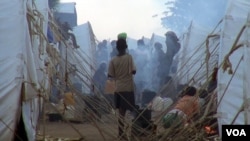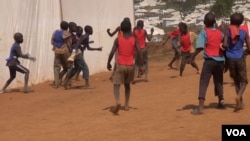The white tents stretch almost to the horizon, lined up in neat rows across the red-clay and gnarled-tree landscape of eastern Rwanda, like an army encamped for invasion.
This, however, is an army of fear and uncertainty: tens of thousands of Burundians who have fled the deepening political chaos in their home country, and created one of Africa’s worst refugee crises.
Ruth Niyongere is one of at least 27,000 now living at the United Nations-administered camp near the town of Mahama, on the border with Tanzania. She says she has no need for politics; what she needs is soap, which is what she was standing in line for on a recent June morning.
“We have security here but we miss some stuff. Some get served, others not,” said Niyongere, who fled her home in Burundi in the middle of the night, along with her four children. “The last time we came for blankets, when we were still on line, we were told to go and come back tomorrow. The following day we could not get anything. We could not get cooking pots, sheets, kids’ clothes. Only a few people were able to get them.”
WATCH: Life is a Grind at Burundi's Mahama Refugee Camp
Burundi’s political woes have unleashed a refugee deluge: More than 144,000 people have fled to neighboring countries in the three months since President Pierre Nkurunziza’s announcement that he would stand for a third term sent opposition protesters into the streets and the country lurching toward chaos and collapse.
The turmoil has only worsened life for one of the poorest countries in the world, a country whose wounds from a 12-year civil war are nowhere close to being healed.
Burundi’s first democratically elected leader, Melchior Ndadaye, was assassinated in 1993 after only 100 days in office. The assassination set off a spree of killing between the countries’ two main ethnic groups, the Hutus and the Tutsis, and as many as 300,000 people were killed in the 12 years of fighting that followed.
The bloodletting may have also been one factor in the genocide in 1994 in neighboring Rwanda, when Hutus massacred more than 500,000 Tutsis over a 100-day period.
For many Burundians and Africans more widely, Nkurunziza’s August 2005 swearing in held the promise of peace and stability. In recent years, however, doubts have grown about his intentions. The announcement by the ruling party on April 25 that Nkurunziza would stand for a third term was the last straw for the political opposition.
Riots erupted in the streets, and an army general tried to stage a coup. More than 70 people died and more than 500 were wounded in the clashes, according to Pierre Claver Mbonimpa, president of a leading human rights group, APRODH.
Despite mounting calls from African, European, U.S. and other international leaders for the Nkurunziza government to defuse tensions, officials have forged ahead with the disputed plans for elections.
On Monday, the government held parliamentary and local elections, a vote that international monitors refused to observe.
Underscoring how the political turmoil has unleashed deep fears, relief workers reported a surge in refugees crossing borders ahead of Monday’s vote, according to the United Nations refugee agency, known as UNHCR, pushing totals to more than 66,000 in Tanzania and more than 56,000 in Rwanda. In the Democratic Republic of Congo, about 11,500 Burundians have taken refuge, along with 9,000 in Uganda and a few hundred in Zambia.
The influx has pushed many of the camps to their limits; cholera broke out among refugees in the Kigoma area of Tanzania last month where 50,000 Congolese refugees have also been living, refugees from another intractable conflict.
"People tell us they are fleeing general political instability and election-related violence, including small-arms and grenade attacks, and arbitrary arrests," Adrian Edwards, a UNHCR spokesman, said in a statement.
On Wednesday, seven people died in a neighborhood southeast of Bujumbura after protesters clashed with security forces, news reports said.
The presidential vote that Nkurunziza is running in is scheduled to go forward on July 15. That has further deepened tensions and stoked rumors and fears of more coups, rebel militias or a return to open warfare.
For his supporters and allies, Nkurunziza’s decision to run again for the presidency is justified. He has a legal mandate to run, said Willy Nyamitwe, a presidential media adviser, thanks to a constitutional court decision issued last month.
“The constitutional court came out with a decision saying that this candidacy does not violate any law of the country, so no one else in the country or outside the country can say this is a violation of our constitution,” Nyamitwe told VOA.
For the 30,000 or more refugees at the Mahama camp, politics are a secondary concern. For most, life is a daily grind of lines and queues: for water, for food, for soap. The white UNHCR tents are shelter from inclement weather, but many people complain that they become saunas in the midday Rwandan heat, where temperatures climb in the 90s.
Throughout the sprawling encampment, men and women wind their way among the tents with wood for cooking fires, whose smoke fills the air in the evenings and makes your eyes tear. Women try to use tin wash basins to clean clothes, and twig brooms to bring a semblance of order to their chaotic lives. Children and many adults alike line up with jerry cans in an endless cycle to collect clean water from makeshift spigots for drinking, washing and cleaning.
“Life is difficult. Difficult,” said one man who asked that his name not be used, out of fear for relatives back in Burundi. “Wood for heating is a headache. Food is insufficient. They give us insufficient quantities but they tell us it’s only the beginning, they are in the middle of preparations, that there is no budget voted for that. It’s a situation that arose suddenly. We can’t complain. Maybe in the future things will go well.”
“We all sleep here, male and female together,” said another woman who also declined to give her name. “We do not have enough room to sleep. We do not have enough blankets to cover our bodies. We share the only four blankets we have and that why we are obliged to sleep together. This is uncomfortable.”
Soccer is a constant feature throughout the camp, with barefoot boys chasing worn balls through clouds of dirt with the intensity of a World Cup match. In the evenings, as the heat eases, the alleys and paths among the tents become communal meeting spaces to trade notes on relatives, on news and on the latest shipment of aid supplies.
Many refugees told VOA that they fled mainly out of fear, as groups of Imbonerakure — young militias allied with the ruling party — harassed and intimidated people, particularly those suspected of having sympathies to opposition politicians.
“People were living in a situation of intimidation, aggression and threats on the part of the youth of the Imbonerakure,” said Transom Abenayo, who called himself the president of the refugees at Mahama. “These young Imbonerakure are armed with heavy weapons, light weapons and traditional weapons.”
“We fled Imbonerakure, they intimidated us,” said Niyongere, the woman waiting in line for soap. “Weapons and grenades were distributed to them in order to kill us. They named us ‘against them,’ and asked us to [kill] ourselves before they came to burn us. Before I fled they were surrounding my house all nights with torches to illuminate inside of our houses. They said no one will survive.”
Nyamitwe, the presidential adviser, insisted that most of the refugees fled not out of direct threats, but out of unfounded fear.
“When you go to visit them, you will find that none of them has been injured and none of them will tell you they have lost any of their siblings or relatives,” he told VOA. “That means people are fleeing because of rumors.”
Few are predicting a letup in the outflow of people and the strains it is putting on relief agencies, and the governments of neighboring countries grappling with their own endemic problems.
“With each passing week, it looks like this camp may be here for quite a long time,” said Jeff Drumtra, a UNHCR spokesman at the Mahama camp.
VOA’s Eddie Rwema contributed to this report from Bujumbura, Burundi.


